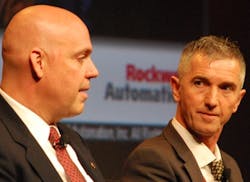Connected Enterprises Mean Opportunity, Responsibility for OEMs
"Downtime cannot be reduced to zero, but it is the direction we're heading," said Bruno Alberti, innovation and technical director at CT Pack in Ferrara, Italy, who participated in an Automation Perspectives panel discussion today in the run–up to Automation Fair in Anaheim, California. "We can use remote monitoring. We are creating a standard base for communicating the data from our machines to our customers. What's important is what information we're sending to the customer, not so much how we're doing it. At first they were asking for OEE (overall equipment effectiveness) and other KPIs (key performance indicators), and now they're asking for things like power consumption. We can do much more."
Remote connection allows CT Pack to connect each new machine to its site. "If I can see the consumption, I can see the stoppages," explained Alberti. "If I can see the historical data, we can think about a machine that can ask for spares. And think about training. For us it's difficult to make training available because we are a small company, and we are in Italy."
In terms of the value drivers, machine builders are keenly interested in faster time to market, said Blake Moret, senior vice president, control products and solutions, Rockwell Automation. "Whether it's faster line integration or skid integration in process applications, faster connectivity brings value," he explained. "A lot of times, downtime lasts longer than it needs to because you can't have an expert everywhere. The Connected Enterprise can bring that person in remotely, which lowers the total cost of ownership. Every time you have downtime on an asset, it's going to cost a process customer upward of $30,000/hr. Often that downtime is going to last five hours. Enterprise risk is mitigated when you're able to remotely operate and monitor equipment; you're able to keep an operator out of harm's way."
First Solar's Mike Sweet (left), along with co-panelist Bruno Alberti of CT Pack.
First Solar, a provider of photovoltaic energy solutions headquartered in Tempe, Arizona, also is an EPC firm for its own operations, and it uses a follow–the–sun support model for its remote monitoring and service. "We have our own operations and maintenance (O&M) business," explained Mike Sweet, director - MES at First Solar. "With our fleet, we have 99.9% availability. When I first started seven years ago, we were operating on spreadsheets, and now we're operating on SAP. In our long-term strategy, we think in terms of capabilities. But at first, we were focused on tactical. It was frustrating because we would start down a path, and then we would change. Other than adding O&M and adding EPC, all of the other capabilities we had in place are still there."
First Solar also has made significant increases in production capacity during Sweet's tenure, moving from 200 MW when he joined the organization in 2007 to 1.8 GW today. "I'm not really a numbers guy, but most people measure by the numbers," said Sweet. "First Solar is a young company. We didn't know what we were doing. We put together a Connected Enterprise because we thought it was a good idea. Our numbers are a result of a company that's doing well. But what we're really doing is changing the world."
Rockwell Automation has been talking about integrated architecture for quite some time, explained Moret. "In the past, you installed a piece of equipment, and if it met the production requirements, that was enough. But today you have to make that data and that information available to improve the organization, where decisions can be made," he said.
Making actionable information available where and when it's needed is at the core of The Connected Enterprise. Whether it's providing real–time information to operators on the line or sending the data to the cloud for analysis, the value is in the context. "I have some controversial opinions on cloud and IoT in general," offered Sweet. "We collect terabytes of data. We added 1,800 new connected devices last year. We collect data on over 50,000 data screens. We also collect data from our power plants, so we get very high–frequency data. It's important for us to tie that data back to the manufacturing process. We warranty our product for 25 years, so we have a pretty big exposure if we don't know what we're doing."
The aspect of the IoT that keeps Sweet up at night is security. "An island of information has perimeter security," he explained. "But as we move to the cloud, perimeter security hasn't been thought out yet. The cloud is ideally where I can build QA environments and test them. I started in IT and went to OT, and now I'm a blend. Normally MES came from process, instrumentation and control. It's no longer that. They put MES inside of IT. We still have a collision, not a convergence, between IT and OT at First Solar, but it's getting better. The Internet of Things is driving IT people into the manufacturing space."
Younger workers today know what plug-and-play looks like, added Moret. "There's a place for real-time control," he said. "There's a place for analysis at the edge. There's a place for collecting the big data to compare non-intuitive data sets and to look at a different degree of analysis in the cloud. The concept of The Connected Enterprise reinforces a message we've used with our traditional products for a long time. The other piece is the brand-new value that you see. It brings us into new applications. Five or 10 years ago, how much would Rockwell Automation have been talking about retail LNG dispensing, which we're working on now with Shell? It's founded on the basic expertise that we have. We're monitoring our own machines in thousands of locations. We're bringing data back on voltage information and other process information to complex monitoring of machines."
CT Pack sees many opportunities, including cost savings and security, said Alberti. "But our customers don't want to share data," he said.
"Sometimes the owner will say, ‘That's my data,'" agreed Sweet. "As more companies begin to understand the value of the data, there will be less willingness to share the data or allow access to the data. To talk about not connecting should not even be on the table. As technology has moved on, it's enabled certain things. In our overall IT department, we're 80% virtualized. We provided customers with a virtual landing pad, and then we can control better what they're able to do. Even our controls engineers are using virtual laptops. That was a milestone."
About the Author
Mike Bacidore
Mike Bacidore

Leaders relevant to this article:



